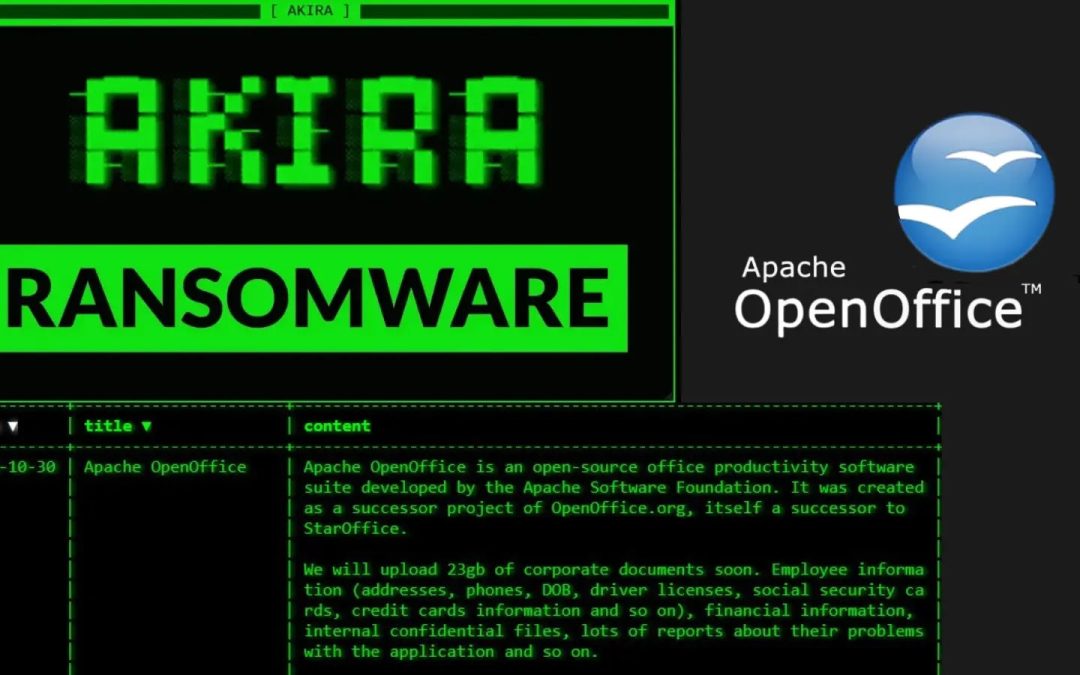“`html
The infamous Akira ransomware collective declared on October 29, 2025, that it successfully infiltrated the networks of Apache OpenOffice, exfiltrating an astonishing 23 gigabytes of confidential corporate information.
Renowned for its relentless double-extortion methods, the group shared information on its dark web leak platform, warning that it would disclose the data unless a ransom was settled. This event highlights the rising threats confronting even non-profit software organizations in today’s landscape of advanced cyber dangers.
Apache OpenOffice, a fundamental component of free office productivity solutions developed under the Apache Software Foundation, has consistently served as a viable alternative to proprietary suites such as Microsoft Office.
The application consists of Writer for text processing, Calc for spreadsheets, Impress for presentations, Draw for vector graphics, Base for databases, and Math for equations, accommodating over 110 languages on Windows, Linux, and macOS platforms.
With millions of users globally, particularly in education and small enterprises, the initiative depends on volunteer contributors and community funding. The purported breach does not seem to jeopardize the public download servers, thereby keeping end-users’ setups secure for the time being.
Details of the Alleged Breach
Per Akira’s announcement, the pilfered information includes highly sensitive employee data, such as physical addresses, telephone numbers, birth dates, driver’s licenses, Social Security numbers, and credit card information.
Financial documents, internal confidential files, and comprehensive reports detailing application bugs and development challenges are additionally claimed to be part of the stolen cache.
The group proclaimed, “We will soon upload 23 GB of corporate files,” emphasizing the magnitude of the breach into the foundation’s operational infrastructure.

As of November 1, 2025, the Apache Software Foundation has neither confirmed nor denied the breach, with representatives refraining from immediate comments to cybersecurity news outlets.
Independent validation remains difficult, sparking inquiries about whether the information is newly obtained or rehashed from earlier breaches. If genuine, the exposure may facilitate identity theft and phishing schemes targeting employees, although the open-source characteristic of OpenOffice limits direct threats to the software’s codebase.
Akira, a ransomware-as-a-service operation that emerged in March 2023, has accumulated tens of millions in ransoms through numerous assaults across the U.S., Europe, and other regions.
Specializing in data extraction prior to encryption, the group employs variants for Windows and Linux/ESXi systems, even compromising victim webcams for additional leverage.
Interacting in Russian on underground forums, Akira notably avoids systems featuring Russian keyboard layouts, indicating potential geopolitical preferences.
This incident arises amid a surge in ransomware attacks directed at open-source projects, prompting calls for enhanced security measures within volunteer-driven systems.
Organizations utilizing Apache OpenOffice are urged to watch for suspicious activities and guarantee that data backups are secure. As Akira’s claims remain unresolved, the cybersecurity community is closely monitoring for evidence—or repercussions—that could alter trust in collaborative software development.
“`

